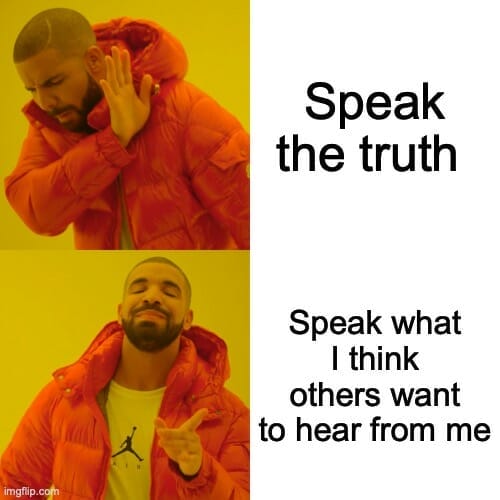
The Power of Honest Communication with Your Romantic Partner
- Updated: July 10, 2024
How is your love life these days? Is it good, so-so, or is there room for more improvement? Well, regardless of where you are now, there is room for improvement, and it all depends on your ability to have honest communication with your romantic partner.
As a life and business coach, it is my job to help you find satisfaction in all areas of your life, including your love life.
In this article, we will discuss what honest communication looks like and, more importantly, how you can stay committed to your inner integrity as you speak with your spouse or romantic partner.
As you read, I’ll ask you many questions to help you understand yourself and your romantic partner better. This will help you really see what’s going on in your relationship. I highly recommend you write your answers so you can later reflect about them and talk them with someone (hopefully your partner).
First, let’s talk about how trauma or a painful past can limit your ability to be honest.
How Trauma Limits About Honesty With A Romantic Partner

Someone asked me, “How can a man and a woman be together?”
My answer was, “It depends on their commitment to honesty.”
We know the key to a happy relationship lies in their level of honesty towards each other. However, it’s not always easy for some individuals to be honest in their relationships, especially if they’ve grown up in an environment where honesty wasn’t always valued.
How a Painful Childhood Affects Romantic Relationships
Replicating the Crazy
It’s important for people who went through this kind of trauma to seek help and work on overcoming these past experiences. With support and guidance, anyone can learn to be more honest and build healthy relationships based on openness and trust.
In the next section, we will talk about how you can have honest communication with your romantic partner or spouse. The first step is about being honest with yourself and your romantic partner.
Embracing Vulnerability: The Key to a Healthy Relationship

I know you want to hear strategies on how to get your romantic partner or spouse in line, how to get them to do what you want.
But the truth is, the health of your relationship starts with you. It means being more honest about your needs and desires.
Being true to yourself can be hard if you’ve always been expected to be perfect and never complain. However, it’s important to recognize your strengths and accept the areas where you may struggle. Let’s dig deeper in how to do that. And yes, it always starts with you.
Get Comfortable with the Real You
As a life coach and healing practitioner, let me talk to you for a moment as a fellow human being. When I was dating my now-husband, I didn’t want him to know about my messy and questionable past.
I feared he would label me as a hopeless drunk who used perfectionism to hide my insecurities. However, if I wanted to spend my life with someone, it couldn’t be based on a façade I couldn’t maintain. It was time to examine who I was so that I could be fully present and happy with my romantic partner.
Reflecting on Self-Worth: Questions to Embrace Your True Self

While I knew I wasn’t perfect, I somehow put my now-husband on a pedestal, thinking he could do no wrong. This idealization made me uncomfortable with who I was. Clearly, I interested him enough for him to court me, but I focused all my attention on him and not on why I was valuable. Here are some questions to ask yourself to get more comfortable with who you are as a person:
- What are my strengths and positive qualities?
- What do I enjoy doing, and what makes me happy?
- What are my core values and beliefs?
- How do I handle stress and challenges?
- What are my goals and dreams for the future?
- How do I want to grow and improve myself?
- What kind of support do I need from my partner?
- How can I communicate my needs and feelings honestly?
Taking the time to answer these questions can help you understand and appreciate yourself better, leading to a healthier and more authentic relationship.
Next let’s talk about how our expectations of our romantic partner can cause confusion in pain in our life.
What Happens When Our Expectations Don't Sync With Your Romantic Partner
I’m going to be real with you and say that I’ve watched my fair share of reality television shows. I don’t always know what people are arguing about or why, but I know that behind each argument is a lot of drama and unspoken or unmet expectations.
It makes for great drama but terrible relationships in the real world. The stress from these conflicts can cause high spikes in stress hormones like cortisol, adrenaline, and norepinephrine, which limits your ability to fully connect with your romantic partner.
Here are signs that your expectations for your relationship are not in sync with your partner’s:
- Frequent Misunderstandings: You often find yourselves arguing over simple things because you each expect something different.
- Feeling Unfulfilled: You or your partner often feel that your needs are not being met.
- Constant Disappointment: You are frequently let down because your partner isn’t meeting your expectations.
- Avoidance of Important Topics: You both avoid discussing crucial issues because you know it will lead to conflict.
- Emotional Distance: There’s a growing gap between you, and you feel less connected.
- Blaming Each Other: You blame each other for the relationship problems instead of working together to solve them.
Fixing Issues and Loving Your Romantic Partner Better
Being happy with your loved one isn’t something you stumble upon by accident. It takes intention. In this section, I’ll discuss some common issues that cause friction between couples.

Step 1: Have Boundaries
There is something very powerful about vocalizing your boundaries. It makes you know your needs and decisions. Also, it allows you to establish a point of reference and put it out in the open. Most of all, it saves a lot of heartbreak and frustration for both you and your romantic partner.
As mentioned earlier, you cannot have a real relationship with one or both partners pretending to be something they’re not. This includes being honest about each other’s needs and desires. First, let’s talk about a common boundary problem: sex.
Boundaries With Sex

Take, for example, feeling like you want to have sex with your partner every single night. But that might not always be doable, especially if you’re tired or busy.
What you might actually need is just some cuddle time every day to feel close to your partner. When it comes to sex, some folks who are hooked on it use it as a fake way to feel connected, instead of talking about their real feelings.
And if you’re craving more time with your partner, doing stuff together or with your family, make sure it’s because you genuinely love being together, not because you’re trying to avoid dealing with tough stuff.
Let’s talk about another common problem that romantic partners face: how they use their home space.
Step #2: Harmonizing Home Spaces: Finding Common Ground with Your Romantic Partner
If you’ve watched TLC, HGTV, or any show where people share their lives on TV, you know a common problem: each romantic partner has different ideas about how to use parts of their home.
One person might want to turn their office into a play area for the kids, while the other is upset because the yard has become a hangout for alley cats, which their partner is allergic to.
As simple as it sounds, it’s important to make sure both you and your partner agree on how to use every room in your house and why it matters to each of you. I’ve contributed to an article that helps clear up confusion about shared space use. Read it here.
Next, let’s discuss how money might be keeping you from connecting fully with your partner.
Step 3: Be Honest About Your Money

Money can be a big deal in relationships. It’s important to be open and truthful about how you handle money together. Here are a few things to think about:
Talk About Your Spending: Are you both on the same page about how much to spend and save? Maybe one of you likes to splurge on gadgets while the other prefers to save for vacations.
Be Transparent About Debts: Do you have any debts, like student loans or credit card bills? It’s crucial to share this information so you can make joint decisions.
Discuss Financial Goals: What do you want to achieve financially as a couple? Whether it’s buying a house, saving for retirement, or paying off debts, having shared goals can bring you closer.
Being honest and open about money can help you build trust and avoid misunderstandings. It’s an essential step in creating a strong and united partnership.
Next, let’s talk about how other people can impact your relationship with your romantic partner.
Step 4: Navigate Influences from Others

People outside your relationship can have a big impact. It’s important to handle these influences wisely:
Family and Friends: Are they supportive of your relationship? Sometimes, loved ones’ opinions can affect how you see your partner.
Exes and Past Relationships: Are there lingering feelings or tensions from previous relationships? These can sometimes interfere with your current partnership.
Social Circle: How do your friends and social activities influence your relationship? Balancing time with friends and time with your partner is key.
Work and Career: Does work stress or career demands affect your relationship? Finding a balance between work and personal life can reduce strain.
Navigating these influences requires communication, trust, and boundaries. It’s about protecting your relationship while staying connected to the people around you. This was a lot to read but I hope it gave you some things to think about.
The image below summarizes my best tips. Next, I will share my final thoughts.

Final thoughts
You might be feeling some strong emotions as you read this. Maybe you’ve been having trouble talking with your partner for a while now. Past problems can weigh heavily on your mind, making you feel guilty or ashamed.
Remember, this article alone might not solve everything. It could be helpful to talk to a therapist who specializes in relationships and intimacy. They can give you personalized advice to help you feel closer to your partner.
I’m here to help you too. If you’re having trouble expressing yourself to anyone in your life, whether it’s a family member, friend, or romantic partner, I’m here to support you. Better communication can really improve your relationships, and I’m committed to helping you achieve that.
For even more insight into this topic, I recommend checking out this episode from my podcast or press the play button below.





